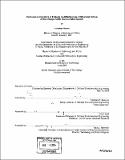Performance indicators to evaluate the effectiveness of structural reform of the Chicago public transportation system
Author(s)
Hesen, Anneloes, 1979-
DownloadFull printable version (5.894Mb)
Other Contributors
Massachusetts Institute of Technology. Technology and Policy Program.
Advisor
Frederick P. Salvucci.
Terms of use
Metadata
Show full item recordAbstract
This thesis anticipates the need for structural change within public transportation systems and the need for clear goals and indicators relating to structural reform to provide real time course correction and periodic evaluation of goal achievement. The research is applied to the Chicago public transportation system because this system is currently experiencing problems and structural reform may be considered in the (near) future. Also, because structural change should deal with problems experienced in a particular system, performance should be evaluated primarily within that system over time and, physical and socioeconomic differences among regions make it difficult to compare systems across metropolitan areas. Literature review indicates that the focus of transit agencies is shifting from design standards to indicators that include a customer perspective. Main stakeholders to be represented in the performance indicators are discussed and the concept of triple sustainability is introduced in the need for indicators that reflect long-term changes in system usage or condition. Also, issues are listed that should be considered when narrowing down and refining potential indicators into a reasonable number of readily measured indicators. The electric utility sector is introduced to find potential lessons of what has worked, and what has failed, that may assist public transportation institutional structure reform. Data sources, both national and international, are studied and the advantages and disadvantages of each are discussed. The history of the Chicago public transportation system demonstrates that tension has always existed between the city and the suburbs and illustrates the importance of political power, governance, and financing. The current (cont.) system and its problems are described after which three solutions for structural reform are suggested, ranging form the current structure to major reform. A framework with triple sustainability, governance and finance is identified, which leads to identification of performance indicators to evaluate the effectiveness of structural reform of the Chicago public transportation system. These indicators are tested against the changes that occurred over the 25 past years as well as the possible problems anticipated over the next 10 years, to "proof" their usefulness.
Description
Thesis (S.M.)--Massachusetts Institute of Technology, Engineering Systems Division, Technology and Policy Program; and, (S.M.)--Massachusetts Institute of Technology, Dept. of Civil and Environmental Engineering, 2004. Includes bibliographical references (p. 92-95).
Date issued
2004Department
Massachusetts Institute of Technology. Department of Civil and Environmental Engineering; Massachusetts Institute of Technology. Engineering Systems Division; Technology and Policy ProgramPublisher
Massachusetts Institute of Technology
Keywords
Civil and Environmental Engineering., Technology and Policy Program.